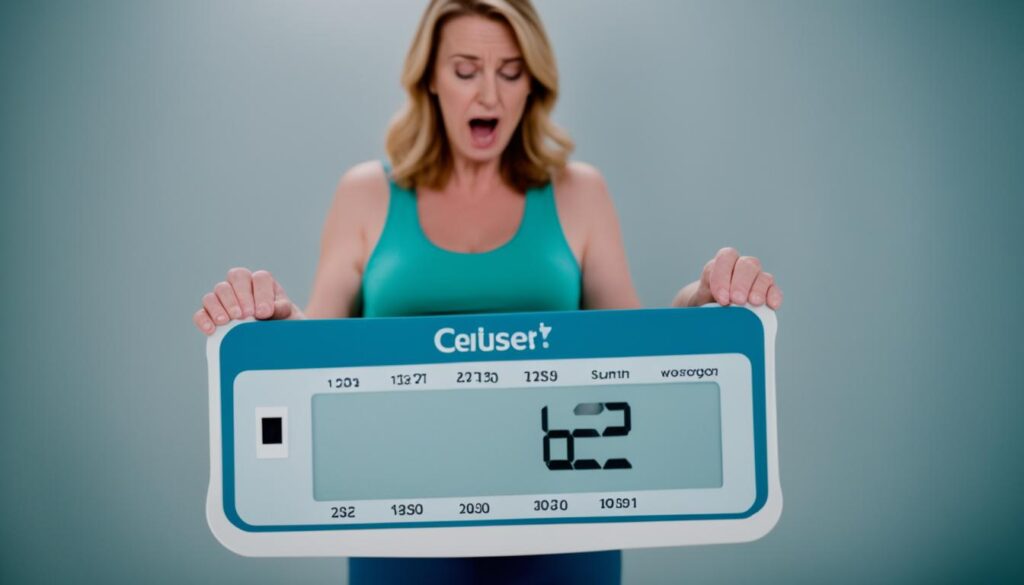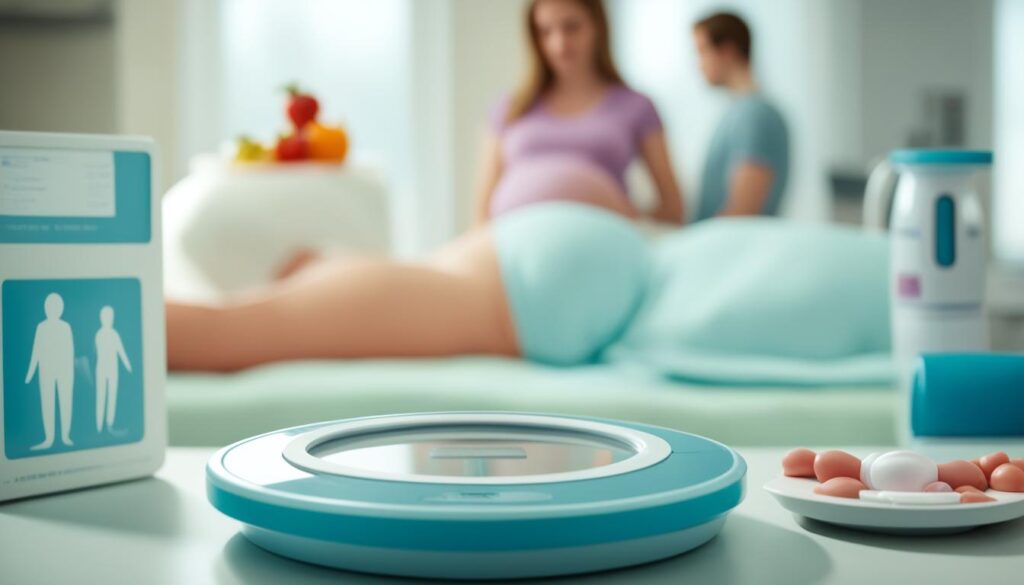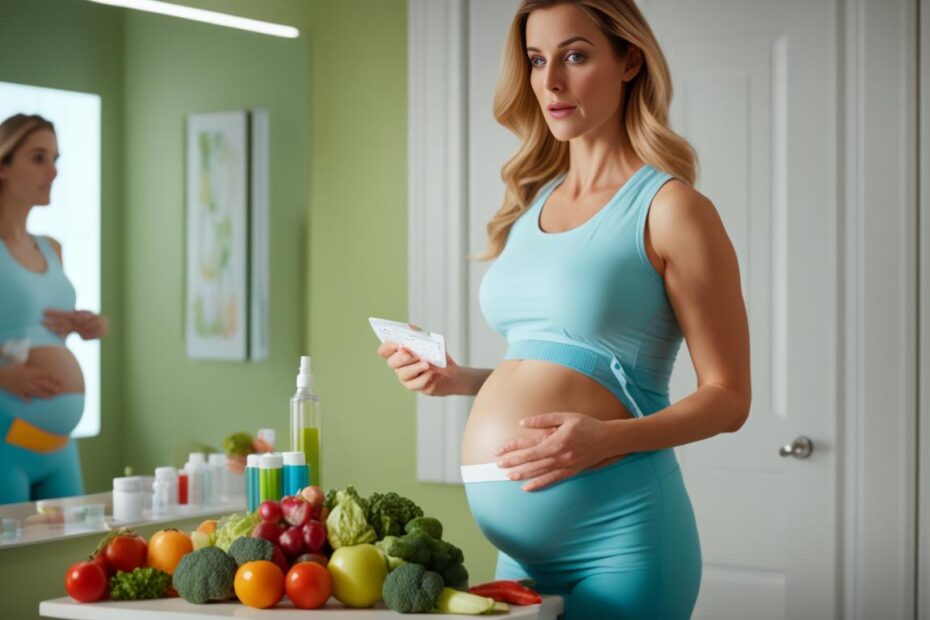Many people wonder if losing weight without reason might mean they’re pregnant. It’s a normal thought, but the truth can be unexpected. Early signs of pregnancy are not the same for everyone, and losing weight is not commonly one of them.
Usually, women gain a bit of weight in their first few months of pregnancy. Yet, it’s okay if your weight isn’t changing right now. Each pregnancy is different, and you might not feel or gain like someone else does. So, let’s talk about what to really look for in the early stages.
Is Weight Loss A Sign Of Pregnancy: Debunking the Myth
Pregnancy weight loss often confuses expectant moms. But let me clear up some things. While weight gain is common, some may lose weight at the start. We will look into this to understand better.
Understanding Normal Weight Changes in Early Pregnancy
Weight gain is normally low in the first trimester. Most women gain just 2-5 pounds. Some might see their weight go up and down due to morning sickness.
Always remember, every pregnancy is different.
The Role of Morning Sickness in Weight Fluctuations
Up to 70% of women have morning sickness. It can cause you to lose a little weight or not gain any. This usually starts at week 6 and ends at week 12. So, if you’re losing weight in early pregnancy, it’s okay. It’s usually temporary.

When Weight Loss Might Be a Concern
But losing too much isn’t good. If you’re dropping more than 5-10% of your weight, see a doctor. A rare but serious cause is severe morning sickness, which needs quick medical help.
Don’t forget, seeing your doctor regularly is very important. They will help you keep track of your health and your baby’s growth.
Common Early Pregnancy Symptoms to Watch For
Pregnancy changes your body in many ways. Weight changes are typical, but other signs show up earlier. Let’s check out those early hints.

Feeling exhausted is a common early sign. You might start feeling tired just two weeks after conceiving. This tiredness comes from new hormones and more blood in your body.
Your breasts might start to change. Around weeks 4 to 6, they can get sore and bigger. The area around your nipples might also look darker and lumpy.
Morning sickness, or feeling nauseous, begins by week 4 or 6. Yet, it can happen at any point in the day. Almost 70% of pregnant women face this symptom.
Need to pee more often? This is also common. Increased blood flow makes kidneys work harder, making you visit the bathroom more.
Mood swings become noticeable around 4 weeks. You might go from happy to crying very quickly. This is the hormones playing tricks on you.
You might start liking or hating certain foods. Foods you loved could now make you sick. Or you might want foods you never enjoyed.
Pregnancy and its effects on weight vary greatly. Some may lose weight due to nausea, while others might gain. If you’re worried about weight changes or pregnancy symptoms, it’s always smart to talk to your doctor.
The Impact of Hormones on Your Body During Pregnancy
Pregnancy hormones are really important. They make my body change a lot. I feel and look different, all thanks to these tiny chemicals.
How Progesterone and HCG Affect Your Metabolism
Progesterone and HCG are vital during pregnancy. They slow down how fast I digest food. But on the bright side, they speed up my metabolism. That could be why I’m exhausted all the time. They’re also big reasons why I might drop a few pounds in the first few months.
Hormonal Influence on Appetite and Food Aversions
Do you find yourself wanting strange food combos, like pickles with ice cream? Blame it on pregnancy hormones! They can make food seem amazing or awful. I now dislike some foods I used to love. The smell of coffee? Nope, it makes me feel sick.
Emotional Changes Due to Hormonal Shifts
Pregnancy hormones can make me super emotional. Sometimes, I can’t explain why I’m crying. Feeling joyful one moment and then sad the next is part of it. If it’s all too much, talking to my doctor is a good idea.
Always remember, each pregnancy is unique. While hormones change us a lot, we all experience this differently. It’s okay to reach out for help if you need it.
Navigating Nutrition and Weight Gain in the First Trimester
The first trimester can be hard regarding food and weight gain. Many pregnant people feel sick. This might make it tough to eat. Losing 1 to 4 pounds is okay. Just focus on eating healthy foods when possible.
For healthy weight gain in pregnancy, try these foods:
- Foods with folic acid like greens and cereals
- Iron-rich items including meats and beans
- Dairy or plant milks for calcium
- Get Vitamin D from fish or egg yolk
- Omega-3 from salmon or walnuts
If you’re losing weight while pregnant, eat smaller, more frequent meals. This can combat nausea and boost your energy.
Ginger tea or crackers might make you feel better. And, drink plenty of water, even if it makes you visit the bathroom a lot!
Most weight gain comes after the first trimester. You should gain about 2-5 pounds now. If you’re already overweight, you might not need to gain more. Keep up with your healthcare provider for the best advice.
When to Consult Your Healthcare Provider About Pregnancy Weight
I know pregnancy brings many changes and sometimes weight goes up or down. But, if you’re worried about your weight, it might be time to talk to your doctor. They can help figure things out with you.
Signs of Hyperemesis Gravidarum
Toughing it out with terrible nausea and non-stop vomiting? Maybe it’s hyperemesis gravidarum. This serious condition might cause you to lose weight. Your doctor can use IV fluids and medicine to make you and your baby better.
Addressing Concerns About Unexplained Weight Loss
If losing weight without trying is happening, let your doctor know. This is even more urgent if there’s cramping or bleeding. Staying safe and getting checked out is the best move.
The Importance of Regular Prenatal Check-ups
Those prenatal check-ups are crucial for both you and your baby. Your doctor will check your weight, blood pressure, and health. They’ll offer tips on eating right and handle any weight concerns with you during pregnancy.
